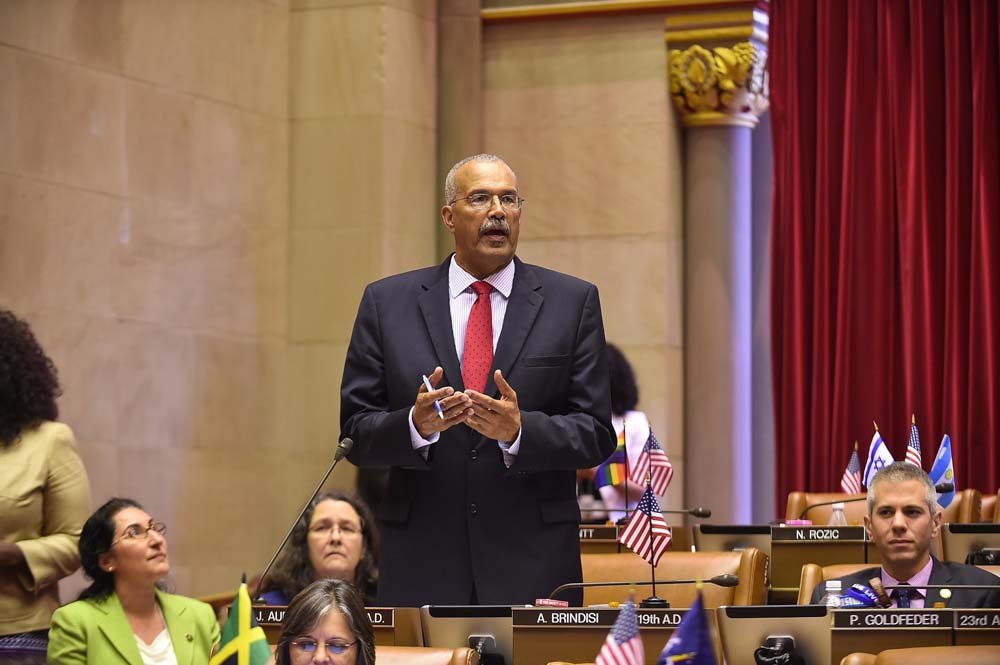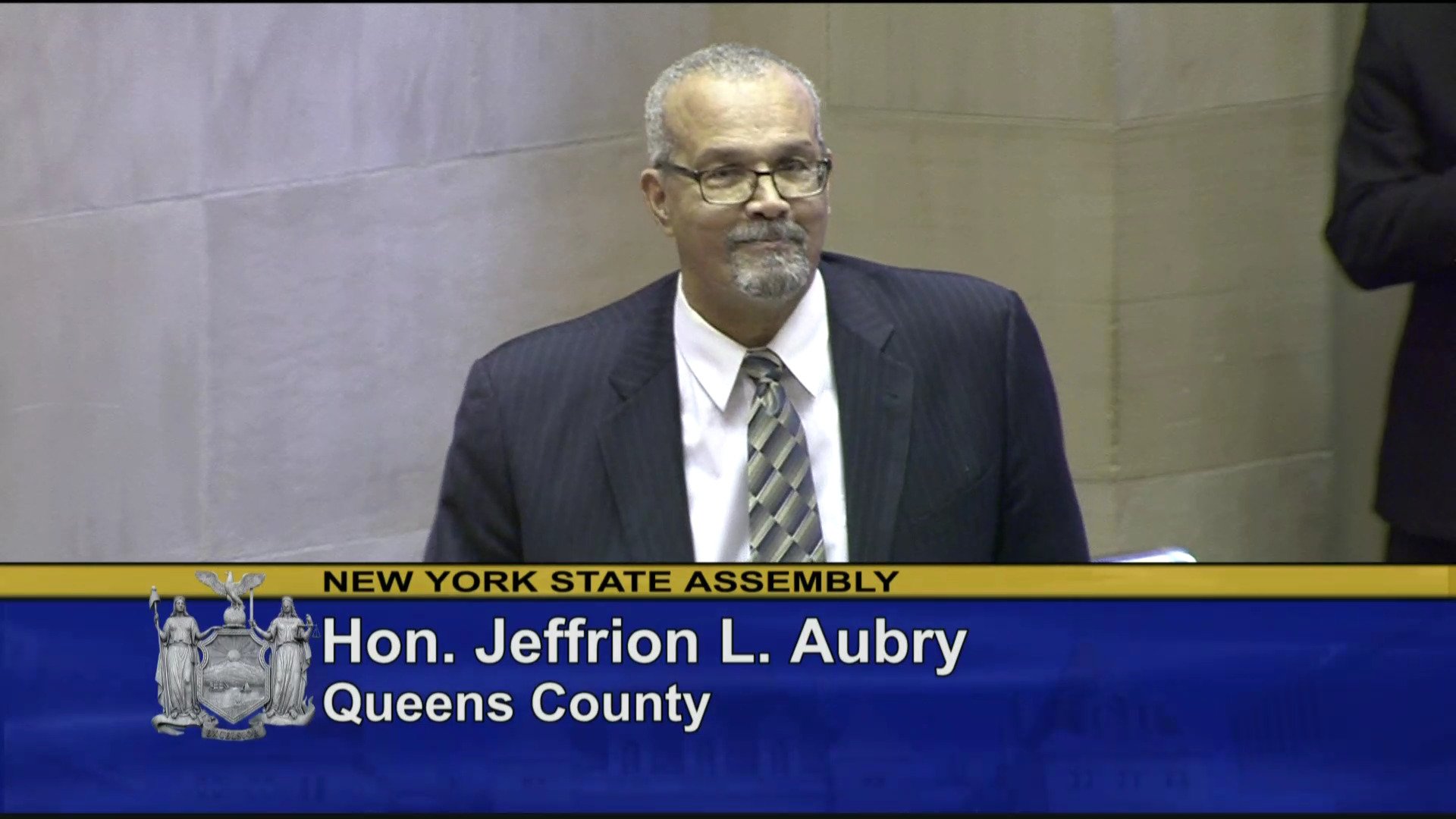Veteran Queens lawmaker passes final bill
/Retiring Queens Assemblymember Jeffrion Aubry passed his last bill as a member earlier this month with the Jury of Our Peers Act, which would allow for people with past felonies to serve on juries.File photo via Aubry/NYS Assembly
By Ryan Schwach
When the Jury of Our Peers Act – which allows people with past felonies to serve on juries – was passed in Albany earlier this month, it had an extra meaning for the state assemblymember who sponsored it.
For Assemblymember Jeffrion Aubry, who has represented Queens in Albany since 1993 and who has served as speaker pro tempore for the last decade, it wasn’t just the bill’s passage that was worth celebrating, but the fact that this bill would be his final legislative act in a long career as a lawmaker.
After three decades in Albany, the 76-year-old legislator will retire at the end of his current term in December. Though he wrote and passed bills touching on a range of issues, Aubry was particularly focused on passing criminal justice-related bills during his time in the state capitol, which ended – at least, legislatively – earlier this month with the passage of the Jury of Our Peers Act in the final days of the legislative session.
The bill, which was sponsored by Aubry, who formerly served as the chair of the Assembly’s Committee on Correction, alongside Manhattan Senator Cordell Cleare, reverses what Aubry said is a longtime injustice, and allows people who have been convicted of felonies to serve on juries.
“If they can vote for individuals to be elected and run for office themselves, the idea that they wouldn't be allowed to serve on a jury given the protections that already exist… just doesn’t make sense,” Aubry told the Eagle in a phone interview.
“They bring everything everybody else brings, [including] the ability to to understand questions that one might have relative to somebody's guilt or innocence,” he said.
The bill currently awaits Governor Kathy Hochul’s signature. The governor’s spokesperson, Avi Small, said that she will “review the legislation.”
It wasn’t necessarily purposeful that the Jury of Our Peers Act was Aubry’s last bill, but it being a criminal justice bill marks a full circle moment for the lawmaker who began his professional career in criminal justice.
Out of college, Aurby worked as a teacher in prisons in New Mexico, and brought that work with him back home.
“That kind of laid a foundation for me to be interested in the criminal justice field,” he said.
Once he was elected to office in 1992, succeeding the late Helen Marshall, who would go on to serve as Queens borough president, he was able to put that knowledge into legislation and pave a way for himself in Albany.
“When I ultimately got elected to the Assembly, my early committees did not involve criminal justice, but at a certain point in time, the Corrections Committee opened up, and I was appointed to be chair,” he said. “I think in part because I had that history.”
Aubry went on to introduce major reforms to the Rockefeller Drug Laws, and helped pass laws which set the tone for better treatment for people with mental illness in the prison systems.
As his career in the legislature draws to a close, Aubry said he wished he had more time to address the state’s mental health needs.
“The mental health services that are provided, both in the institutions and in our communities, has to be looked at and has to be improved, particularly for people who have little means,” he said.
The Jury of Our Peers Act, which currently awaits the governor’s signature, is the last in a long line of criminal justice bills passed by longtime Queens Assemblymember Jeffrion Aubry. File photo via Aubry/NYS Assembly
“When we see people who go around doing things that are inappropriate, I think a lot is based on their mental capacities,” he said. “If you want to reduce crime, if you want to make people safe, then you need to have a mental health system that works in conjunction with the criminal justice system to provide assistance to those kinds of people.”
Going forward though, Aubry will need to approach those goals from a different seat, now as a constituent, rather than an official.
“For the first time, I'm going to have an assemblyperson,” he said.
Aubry is set to retire in December, and has hand-picked a successor in local community leader Larinda Hooks.
However, Hooks faces a primary fight against former controversial elected Hiram Monsterrate, who was expelled from the State Senate after being convicted of misdemeanor assault and who later served time in federal prison for corruption charges stemming from his time in the City Council. Monserrate has previously challenged Aubry for the Assembly seat.
“We're in the midst of an election,” Aubry said. "It's important as far as I'm concerned as to who represents this community and that that person has the best chance of being successful and has the respect of both the community and the peers.”
If there’s one thing he learned in his time in office, it's the importance of gaining the respect of your peers, something he said he noticed as roll was called on what would be the final bill he passed in office.
“My colleagues recognized me as we passed that bill, and on both sides of the aisle, people who voted no, people who voted yes, and that was very fulfilling,” he said. “We are a collegial body, these men and women that I've served with. Some agree with me, some don't. The idea of being a body like ours that makes determinations on thousands of issues over the years, I have a great deal of affection for the body and the individuals who serve.”
Aubry said passing his last bill was an emotional experience.
“I reflected more on how amazing it is that I found myself in a place for 32 years, to work with these men and women to make the laws of the State of New York that covers so many incredibly diverse districts,” he said. “It made me think about all those years and made me think about a lot of people who I served with, who may not necessarily be around anymore, and others who are retired.”
“We always say when a former member comes [to Albany], ‘Once a member, always a member,’” he added. “And I guess that applies to me too.”





